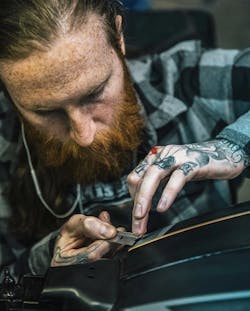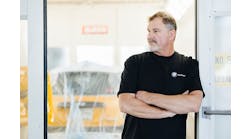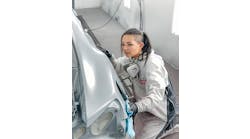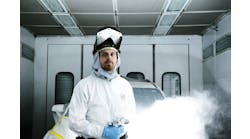If you don’t like what you see, do something better. This adage applies in business, art and even relationships, but it’s one thing simply to quote it; it’s another thing entirely to do it. For Kristian Baena, his doing began one summer in his teens, absorbed by familial osmosis and then transformed into something else entirely.
In Chicago, his grandfather restored Model As while his grandmother handled much of the interior work. His mother washed them, and his uncle had been restoring hot rods for decades. While in high school, Baena spent a summer in Houston, Texas, not far from his uncle’s shop, and that’s where his career—and vocation—in paint began.
“I had a crash course on collision repair, refinish, custom paint and pinstriping and I was hooked after one summer,” he says.
“I took a job in a body shop sweeping floors and learned the process from the ground up; I always saw beautiful artwork but the finish wasn’t up to par, and from there I learned how to properly prep, clearcoat and finish my own projects, and it’s given me a diverse skill set and tool box.”
And who can argue with that?
The Process
Today, Baena is located in Fayetteville, GA, working full-time from home as a custom painter and fabricator. He’s two years into his own business venture after almost a decade running a paint department for a different paint shop. Baena says that grueling hours and time away from his family made the decision to leave his old employer fairly simple, and with over 17 years of experience in the custom paint and refinish industry, Baena was ready for a new start—and challenge.
“I’ve really been putting my head down the last few years to grow my business, so it’s been project after project after project,” he says. Now that he’s working under his own volition, Baena strives to keep the passion and energy high, the headaches low and the projects fresh.
“As an artist with my paint work, I try not to give super hard deadlines because every project is unique,” he says. “Sometimes I have to let that process come to me; it can be a bit of a roundabout because I don’t want to replicate the same thing over and over; I want to customize each project for each client. The art is mine but at the end of the day but the project is theirs, and they’re the ones who need to enjoy it.”
“It’s a great community,” he says.
“There’s not much bickering. Many of us share how we achieved our pieces. There’s more than enough work to go around and it’s better to help each other out. We’re always learning and advancing and keeping up with new technology. I constantly call painters asking how to mix, how to blend this or that, and we’re always pushing each other because we know how much more we’re capable of.”
Baena knows that what he sees is not necessarily what the untrained painter or enthusiast sees. “In my eyes, there’s a level that I need to hit every time,” he says, “despite the fact there’s imperfections in my work as well. There’s no magic wand in this business; no one waves a paint gun and just finishes a job. To make the paint stick and have it lay down properly is a process.”
“This stuff already takes long enough to do the first time,” he adds. “I don’t want to do it twice, especially for free.”
The Plan
For the first time in a while, Baena has a clear vision for what lies ahead.
“I don’t want to lose my passion for what I do,” he says.
“I’ve been in situations when I didn’t want to paint anymore, and I don’t ever want to get to that point again. I want to be able to provide multiple streams of revenue because sustaining large overhead with custom paint work is very difficult because of how slow the process is.”
Baena is excited about the process of his home workshop. It eliminates any prospect of a commute and covers most of the overhead while keeping the job personal with most clients. His shop is ultra clean.
“Because I work and paint in the same environment, my paint jobs are and need to be as clean as the space I’m working in,” he says, “and the less I have to block-sand and buff out, the better I’ll feel about it.” Working in a clean space also allows Baena to achieve his ideal work space, let his mind wander and his skill set to truly emerge.
Baena’s shop is a detached building from his home, and though it’s small, he’ll paint anything that fits in there; recently, he had a full-size Ford F-350 sitting sideways inside of it. Baena usually works 100+ hours per week mostly because he can; he loves waking up early, sipping coffee with his family and strolling outside for a 20-foot walk to the shop. Close to home, he’s even able to entertain The Dragons every once in a while—his rambunctious twin boys.
Looking ahead, he hopes to invest in a larger space to accommodate the joint family endeavors. He doesn’t necessarily want more work but a larger shop and more proper setup will benefit him and his wife. They collect old Cadillacs, after all, and she wants to incorporate a ‘64 Corvair van into her pop-up shop and business venture. Together, they hope to have some fun as a family, traveling to county and state fairs for paint, pop-ups and whatever other opportunities come their way.
“We want this to be a lifestyle. I eat, breathe and live this stuff. My wife and I are just around it 24/7 and it’s a nonstop industry; you have to keep pressing every day.”




